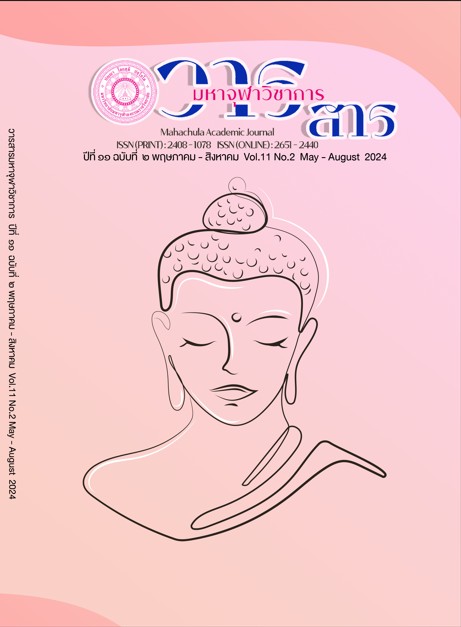Speech Act for Breaking Up a Romantic Relationship in Thai
Main Article Content
Abstract
This research has two objectives: (1) to study language strategies to break up a romantic relationship of Thai native speakers and (2) to analyze factors affecting their use of the language strategies concerning gender differences. The Discourse Completion Test (DCT) was applied and distributed to 40 Thai native speakers: 20 male and 20 female. The data were collected through written responses and interviews. The research results found that the speech act for breaking up the romantic relationship would be found in three situations that were (1) the situation in which the speaker believed that the listener was the offender; (2) the situation in which the speaker admitted that he or she was the wrongdoer; and (3) the situation in which the speaker thought that both the speaker and the listener were wrong. Among these three situations, male speakers were most likely to use the speech act to break up their romantic relationship in the situation 3 while the female speakers were in the situation 1. Besides, there were two patterns of speech act the speakers applied to end their romantic relationship with another person including (1) breakup speech pattern that clearly stated the word “break up” using nine language strategies such as clearly stating an intention to break up, apologizing, self-condemnation and blaming others, and (2) breakup speech pattern that avoided mentioning the word “break up” which was based on eight language strategies that were blessings, apologizing and self-condemnation as examples.
Article Details

This work is licensed under a Creative Commons Attribution-NonCommercial-NoDerivatives 4.0 International License.
References
ณัฐพร พานโพธิ์ทอง. วัจนปฏิบัติศาสตร์กับความสุภาพและวัฒนธรรม: แนวคิดและแนวทางการวิจัยภาษาไทย.
โครงการเผยแพร่ผลงานวิชาการ คณะอักษรศาสตร์ จุฬาลงกรณ์มหาวิทยาลัย, ๒๕๖๖.
ทัศนีย์ เมฆถาวรวัฒนา. “วัจนกรรมการขอโทษในภาษาไทย”. วิทยานิพนธ์ปริญญาอักษรศาสตรมหาบัณฑิต.
บัณฑิตวิทยาลัย: จุฬาลงกรณ์มหาวิทยาลัย, ๒๕๔๑.
เพชรีภรณ์ เอมอักษร. “กลวิธีการบอกเลิกสัญญาในภาษาไทย: กรณีศึกษาผู้ฟังที่มีสถานภาพต่างกัน”. วิทยานิพนธ์
ปริญญาอักษรศาสตรมหาบัณฑิต. บัณฑิตวิทยาลัย: จุฬาลงกรณ์มหาวิทยาลัย, ๒๕๔๐.
รุ่งอรุณ ใจซื่อ. “วัจนกรรมการแสดงความไม่พอใจในภาษาไทย: กรณีศึกษานิสิตนักศึกษา”. วิทยานิพนธ์ปริญญา
อักษรศาสตรมหาบัณฑิต. บัณฑิตวิทยาลัย: จุฬาลงกรณ์มหาวิทยาลัย, ๒๕๔๙.
ศิริพร ภักดีผาสุข. ความสัมพันธ์ระหว่างภาษากับอัตลักษณ์และแนวทางการนำมาศึกษาภาษาไทย.
กรุงเทพมหานคร: โครงการเผยแพร่ผลงานวิชาการ คณะอักษรศาสตร์ จุฬาลงกรณ์มหาวิทยาลัย, ๒๕๖๑.
สิทธิธรรม อ่องวุฒิวัฒน์. “การศึกษากลวิธีทางภาษาจากมุมมองวัจนปฏิบัติศาสตร์ : พระบรมราโชวาท
พระบาทสมเด็จพระเจ้าอยู่หัวภูมิพลอดุลยเดชในพิธีพระราชทานปริญญาบัตร (พ.ศ. ๒๔๙๓-๒๕๓๗)”, วารสารร่มพฤกษ์ มหาวิทยาลัยเกริก. ปีที่ ๓๕ ฉบับที่ ๓ (กันยายน-ธันวาคม ๒๕๖๐): ๙-๓๗.
อมรา ประสิทธิ์รัฐสินธุ์. ภาษาศาสตร์สังคม. กรุงเทพมหานคร: จุฬาลงกรณ์มหาวิทยาลัย, ๒๕๕๐.
อรวี บุนนาค. “กลวิธีการใช้ภาษาแสดงความผิดหวังต่อผู้ฟังที่มีสถานภาพต่างกันในภาษาไทย: กรณีศึกษานิสิต
นักศึกษา”. วิทยานิพนธ์ปริญญาอักษรศาสตรมหาบัณฑิต. บัณฑิตวิทยาลัย: จุฬาลงกรณ์มหาวิทยาลัย, ๒๕๕๐.
ราชบัณฑิตยสถาน. “พจนานุกรม ฉบับราชบัณฑิตยสถาน พ.ศ. ๒๕๕๔ ฉบับออนไลน์”. [ออนไลน์].
แหล่งที่มา: http://www.royin.go.th/dictionary/ [ ๒๐ มีนาคม ๒๕๖๗].
วัชราภรณ์ บุญญศิริวัฒน์. เหตุผลทางจิตวิทยาที่ทำให้ความรักจบด้วยการทำลาย. [ออนไลน์]. แหล่งที่มา:
https://www.psy.chula.ac.th/th/feature-articles/partner-violence-๒/ [ ๒๐ พฤษภาคม ๒๕๖๗].


